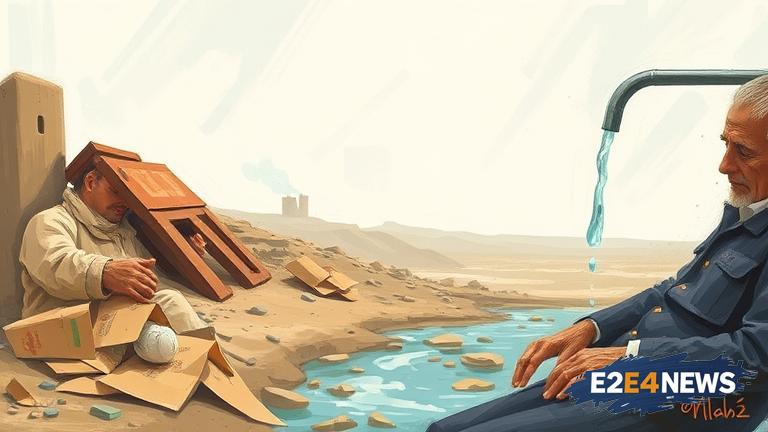The situation in Lebanon is becoming increasingly dire, with hundreds of thousands of people still without access to running water six months after the ceasefire. Action Against Hunger, a humanitarian organization, has warned that the lack of access to clean water is having a devastating impact on the health and wellbeing of the population. The organization has reported that many people are being forced to rely on unhygienic water sources, which is leading to the spread of water-borne diseases. The crisis is being exacerbated by the country’s economic woes, with the Lebanese pound having lost significant value against the US dollar. This has made it difficult for people to afford even the most basic necessities, including food and clean water. The situation is particularly dire in rural areas, where access to clean water is already limited. Action Against Hunger has warned that the crisis is likely to worsen in the coming months, with the summer heat expected to exacerbate the spread of water-borne diseases. The organization is calling on the international community to provide urgent assistance to help alleviate the crisis. The Lebanese government has also been criticized for its response to the crisis, with many accusing it of being slow to act. The government has promised to increase funding for water infrastructure, but many are skeptical about its ability to deliver on this promise. The crisis is also having a significant impact on the country’s economy, with many businesses struggling to operate without access to clean water. The tourism industry, which is a significant contributor to the country’s economy, is also being affected, with many visitors canceling their trips due to the water crisis. The international community has been urged to provide support to help Lebanon address the crisis, including providing funding for water infrastructure and humanitarian assistance. The United Nations has also been called upon to play a role in helping to resolve the crisis, including providing technical assistance and support to the Lebanese government. The crisis is a stark reminder of the need for urgent action to address the root causes of the conflict, including the lack of access to basic necessities like clean water. The situation in Lebanon is a humanitarian crisis that requires a comprehensive and coordinated response from the international community. The crisis is not just a Lebanese problem, but a regional and international one, requiring a collective effort to resolve. The international community must come together to provide support to the people of Lebanon, including funding, humanitarian assistance, and technical expertise. The crisis is a wake-up call for the international community to take action to prevent similar crises from occurring in the future. The situation in Lebanon is a stark reminder of the importance of access to clean water and the need for urgent action to address the root causes of the crisis. The crisis is a major setback for the country, which was already struggling to recover from the conflict. The lack of access to clean water is having a devastating impact on the health and wellbeing of the population, particularly vulnerable groups such as children and the elderly. The crisis is also having a significant impact on the country’s agriculture sector, with many farmers struggling to access clean water for their crops. The situation is a major concern for the international community, with many fearing that the crisis could have far-reaching consequences for the region. The crisis is a reminder of the need for urgent action to address the root causes of the conflict, including the lack of access to basic necessities like clean water. The international community must come together to provide support to the people of Lebanon, including funding, humanitarian assistance, and technical expertise.
